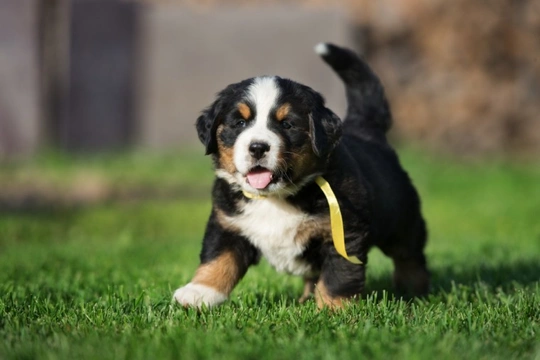
Five mistakes to avoid when socialising your new puppy
Dogs of all varieties are highly social animals, which naturally seek each other out for company, reassurance and entertainment. This behaviour harks back to the days when dogs were pack animals in the wild, and forming packs meant more than just having companionship, but also helped to increase the group’s collective chances of survival compared to those of each dog going it alone.
However, just because dogs are naturally social with each other doesn’t mean that they are born knowing how and why to get on with other dogs, and puppies spend most of their first year of life learning the rules and etiquette of canine communication with other dogs, how to play and interact with others, and how to behave to make sure that everyone gets along.
Learning from other dogs is important for puppies, and even older dogs that are usually fairly intolerant of or uninterested in others will often allow a puppy to play with them, and get away with things that they would not permit from another adult dog. This means that if you have a new puppy or are about to get one, providing plenty of chances for them to socialise is important – but so is ensuring that you go about things in the right way.
Mistakes, issues and problems that arise when socialising a puppy can go on to have long term implications for your pup, and how well they get on with others, but they are usually easily avoided if you know how. In this article we will share five mistakes to avoid when socialising your new puppy, to ensure that they get off on the right foot when meeting others. Read on to learn more.
Going straight to a busy dog park
Puppies generally take to socialising with others immediately and once they have begun to get a feel for it, will usually be very keen to do so again at every opportunity. However, you should delay trips to busy dog parks until your pup is at least a few months old and already used to meeting other dogs in quieter and less crowded situations, so that your pup has already learned their basic communication skills and is confident enough to hold their own.
Dog parks that are busy, crowded or full of boisterous dogs will often be daunting for puppies, and they need to learn social skills progressively – throwing a pup in at the deep end will often backfire, so be speculative about your pup’s first few social meetings.
Not waiting until your dog’s vaccinations take effect
Puppies can be full of beans and a real handful at the best of times, particularly if they aren’t able to leave the house because they’re not fully covered by their vaccinations.
However, it is vital to wait until your pup has had all of their shots and they have taken effect before beginning to introduce your dog to others, as pups are very vulnerable to contagious diseases and not all of the dogs they may meet will be vaccinated.
Some contagious health conditions don’t even require direct contact with other dogs to transmit, just contact with the same areas of land – so don’t be tempted to rush, and also, ensure your pup is flea treated and wormed before they start to meet others too.
Socialising with the same set of dogs repeatedly
To learn good social skills and to be able to get on well with others, your dog needs to meet a lot of other dogs – from those that are keen to play, to those that are shyer, and even those that don’t want anything to do with your pup and will put them in their place to tell them to back off – because these are all dog types and experiences your pup will face repeatedly as they get older.
Every dog has their own unique personality, and in order to learn to get on well with and communicate effectively with others, puppies need to be exposed to lots of other dogs, so ensure that you don’t just take your dog out to meet the same set of dogs every time they socialise, as this won’t set them up well for the future.
Assuming that all dogs are going to be friendly
The vast majority of adult dogs – even those that are generally grumpy and antisocial – will be more tolerant with puppies than other adult dogs. Whether this means letting the puppy take the mickey to an extent in play, or simply refusing to play but without being aggressive about it, pups tend to be given more leeway by adult dogs up until a certain point.
However, this does not hold true for all dogs, and some dogs simply don’t get on well with others, either other dogs in general or puppies specifically. Never assume that all of the dogs you meet will be friendly with your pup, and always introduce yourself to owners and ask if their dog wants to play first.
Intervening too much between the dogs
Puppy owners are often very vigilant about watching and supervising play, which is fine and largely appropriate – but it is best to keep things hands off as a rule, and to allow the puppy and the other dogs to deal with their own disagreements, battles for dominance, and other forms of communication.
Intervening too much hampers your pup’s learning, and will leave them poorly set up to deal with other dogs in the future, so keep a distance unless you absolutely must intervene in order to prevent an accident or injury.



